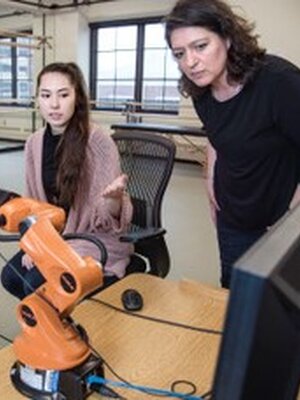
How would you describe your background?
I am a physicist by training as well as a conservatory-trained dancer and teacher, I combined that knowledge to study human movement using dance.
What is your favorite part about research? (Learning new things you didn’t expect, presenting the information at conferences, the writing process, etc.)
My favorite part of research is the discovery of new knowledge and sharing that with young minds while benefiting directly people with movement challenges. Using dance, I can also impact human emotional and artistic expression.
What made the University of Illinois a good place to conduct your research?
The University of Illinois is known as a place where innovation thrives with a strong history of high-quality scientific research. My work is pioneering research developing a new field where arts and science intersect, so the University of Illinois seemed to be good place for it.
What do you do in your spare time?
I have no spare time, however sometimes I garden, and I watch Netflix and YouTube videos. I don’t consider it spare time, but I also take a dance class.
Why don’t you consider taking dance classes as part of your spare time?
It’s not spare time in the sense that I’m learning a new language of dance. I’m a trained ballet dancer but there are different types of dance to learn—while ballet is the “Latin” of dance, every specific type of dance is like a new language. There is a wonderful Zumba class I’m taking right now that’s being taught by a fellow professor. I’m a trained ballet dancer, so it is easier for me to learn new dance forms, but I am still learning. Moreover, it’s not enough to just mentally know what the movements are—you have to practice and strengthen the neural connections that code for movement patterns to have health benefits. Through taking dance classes I come up with new research questions and ways to conduct my research. Some people think of dance as entertainment, but I see it as a cognitively loaded activity.
Can you describe a moment where you failed?
As a researcher, I am self-critical all the time and I see failure as feedback for improvement. So, in some way, I am always failing and it is difficult to single out one moment of failure.
What’s a fact about you that people don’t expect to learn?
When people meet me in the science world, they don’t expect me to be a dancer/dance teacher and vice versa.
If someone in the program, a student or a colleague, needed to refer to you but did not know your name, how would you prefer for them to describe you?
The Neuroscience of Dance professor